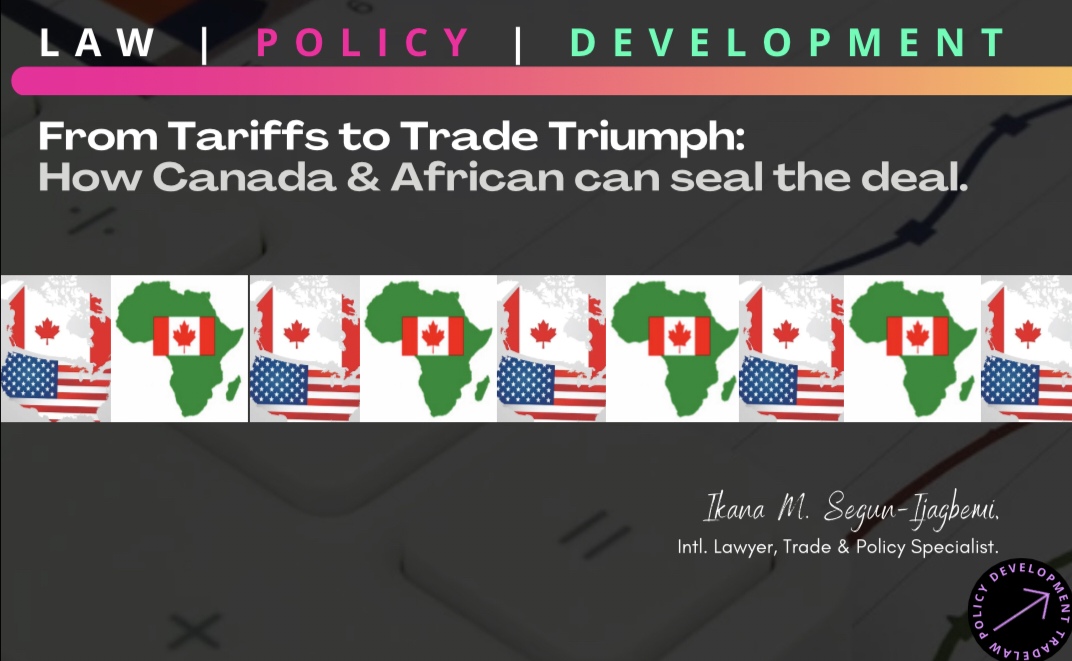Canada-Africa Trade: Seizing Opportunities In A Shifting Global Landscape
Posted on February 5, 2025

The ongoing trade tensions between the United States and China have reshaped the global economy, disrupting supply chains and prompting countries to reassess their trade strategies.
As Canada navigates these shifting dynamics, Africa emerges as a promising frontier for economic diversification and strengthened trade partnerships.
A Call to Action: “Buy African”
According to Mrs. Ikana M. Segun-Ijagbemi, an International lawyer, trade and policy analyst, while Canada reinforces its “Buy Canadian” movement, Africa extends an invitation: “Buy African.”
She said the conclusion of the second Canada-African Union Commission Trade Policy Dialogue in 2024 marked renewed enthusiasm for economic collaboration. However, beyond diplomatic handshakes and press releases, the critical question remains: How can both regions convert political goodwill into tangible economic impact?
“Trade between Canada and Africa has seen significant growth, rising from $9.7 billion to over $16.3 billion in just five years. Despite this increase, it still represents a small fraction of Canada’s total global trade.”
Speaking further, Mrs. Segun-Ijagbemi said in 2022, Canada’s trade with Africa stood at $7.4 billion—dwarfed by its $137 billion trade with China.
“Much of Canada’s engagement remains centered on natural resources, with South Africa, Nigeria, and Egypt as top trading partners.”
“While Africa has traditionally been viewed as a resource hub, the continent is rapidly diversifying. With a combined GDP exceeding $3.1 trillion and six of the world’s ten fastest-growing economies, Africa presents immense opportunities beyond gold, oil, and minerals.”
According to her, the digital economy alone is projected to reach $180 billion by 2025, while fintech giants like Flutterwave (Nigeria), M-Pesa (Kenya), and Chipper Cash (Africa-wide) are transforming financial transactions.
“Meanwhile, Africa’s creative economy—including music, film, and fashion—is booming, with Afrobeats artists achieving global recognition.”
The Need for a New Trade Approach
She said despite Africa’s economic evolution, Canadian investment remains disproportionately focused on energy and agriculture.
“To capitalize on Africa’s growth, Canada must adopt a broader trade and investment strategy that prioritizes: Renewable Energy; Fintech & Digital Infrastructure; Agritech; Artificial Intelligence and Creative Industries.
“To create a sustainable and forward-thinking trade relationship, both regions must establish policies that facilitate investment, innovation, and market access.
Key initiatives include:
Africa-Canada Innovation & Policy Hub: A public-private platform connecting policymakers, investors, and entrepreneurs to develop trade strategies. Housed within the Canada-Africa Chamber of Business, this hub could serve as a focal point for ongoing collaboration.
Sustainable Growth Investment Credit (SGIC): A tax incentive encouraging Canadian businesses to invest in sustainable industries in Africa, focusing on job creation and technology transfer.
Expanded Export Development Canada (EDC) Mandate: Broadening EDC’s trade financing to include creative industries, digital infrastructure, and agritech.
Diaspora Business Fund: A financing initiative supporting African entrepreneurs in Canada, fostering stronger trade linkages and cross-border business opportunities.
Overcoming Barriers to Trade
Several misconceptions persist regarding Canada-Africa trade, with geography often cited as a primary obstacle. However, distance has not deterred China, India, or Turkey from forging strong trade relationships with Africa. The real challenges include:
Regulatory Fragmentation: African startups face inconsistent regulations that discourage foreign investors. Canada can support regulatory harmonization within the African Continental Free Trade Area (AfCFTA).
Infrastructure Deficits: Canada’s expertise in logistics, digital connectivity, and renewable energy can help bridge Africa’s infrastructure gaps.
Financing Bottlenecks: Canadian businesses often struggle to access trade financing. Strengthening financial instruments for Canada-Africa ventures is crucial.
Risk Perception: Establishing an Africa-Canada Trade Risk Assessment Unit can provide real-time market intelligence to mitigate investor concerns.
The Future of Canada-Africa Trade
To remain competitive in global trade, Canada must embrace a long-term Africa strategy, including:
Government-backed Trade Missions: Prioritizing business development over aid conferences by sending Canadian companies on targeted trade missions to Africa.
Sector-Specific Partnerships: Leveraging Canada’s expertise in AI, clean energy, and fintech to enter Africa’s rapidly expanding markets.
Diaspora Engagement Policies: Harnessing the economic potential of African professionals in Canada through strategic investment and trade initiatives.
Centering African Agency: A Shared Leadership Model
While Canada has much to gain, Africa must also take an active role in shaping this trade relationship. African businesses, policymakers, and professionals should advocate for stronger representation in trade policy discussions to ensure their priorities are reflected.
Programs like the B.R.I.D.G.E. Initiative empower African immigrants in Canada by providing resources to establish businesses and drive trade, while young entrepreneurs and women-led startups in Africa are pioneering advancements in technology, agriculture, and finance.
As global trade realigns, Canada faces a choice: remain on the sidelines or seize the opportunity to become a key player in Africa’s economic transformation. The time for strategic action is now, and for Africa, the moment to lead is even sooner.
While “Buy Canadian” dominates headlines, Africa stands ready with a compelling counteroffer: “Buy African.” Canada must act swiftly—before the rest of the world capitalizes on this unprecedented trade opportunity.
Categorised as : Business
No Comments »
Related posts













